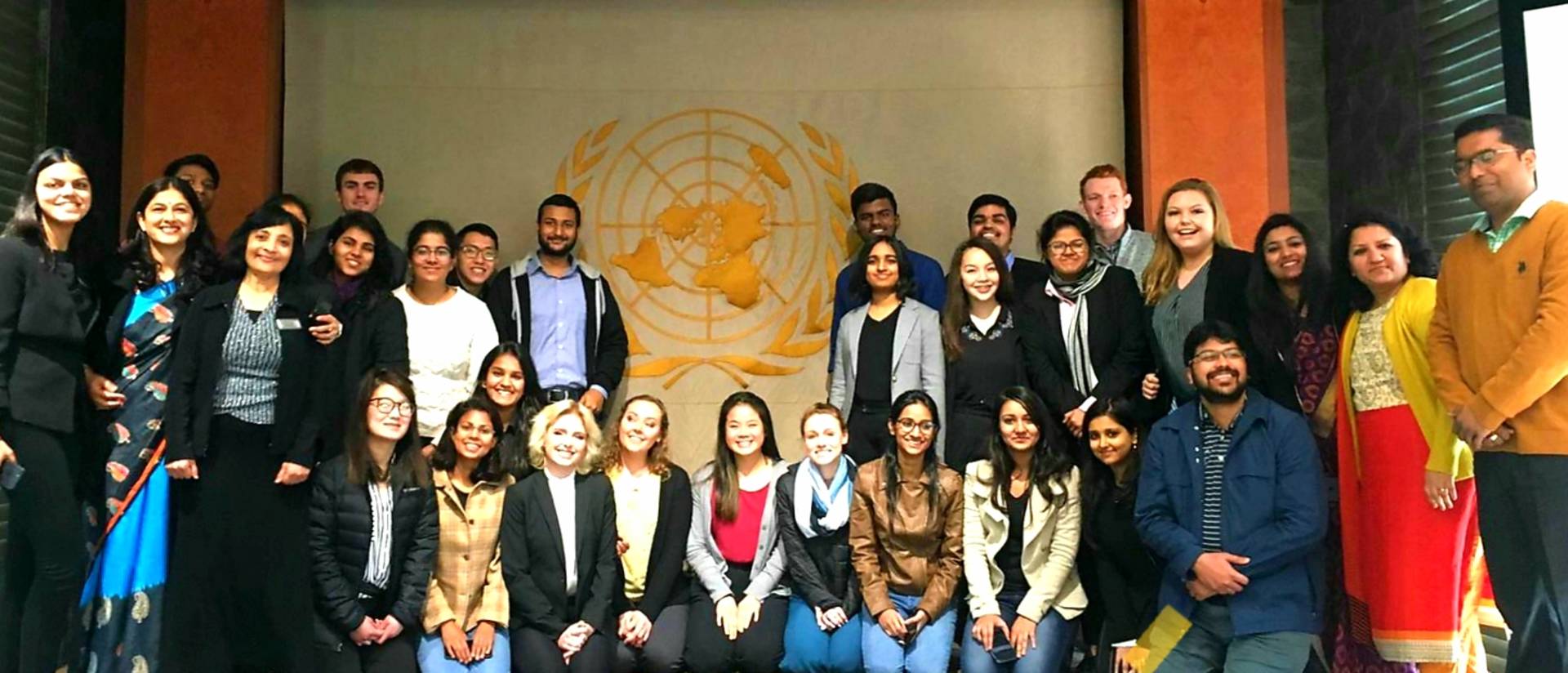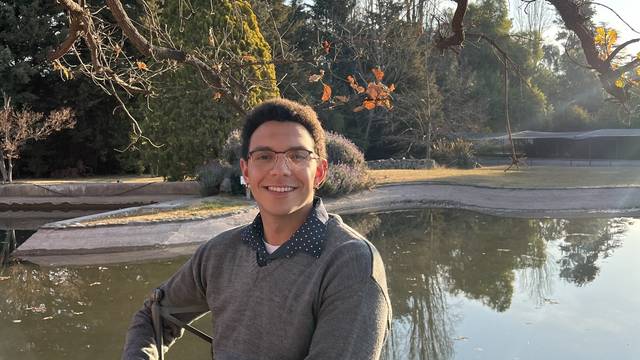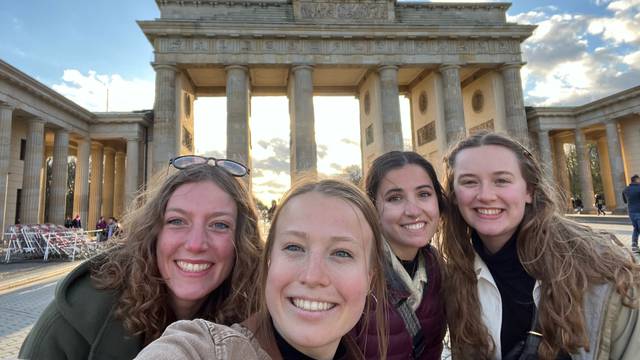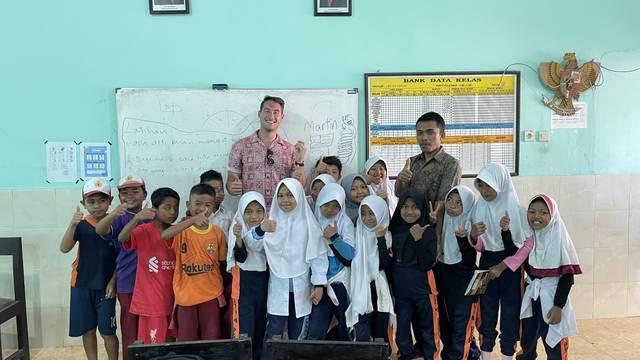"Success Starts Here" is a series of six articles that introduce new students to the UW-Eau Claire College of Business. A new article will be posted each week until the fall academic term begins. This is the fifth article in the series.
Exploring the World
Do you want to travel and meet interesting people around the world? Then study abroad!
"Such an experience will become a bridge to your past, and a ticket to your bright future," according to Dr. Kranti Dugar, assistant professor of marketing. "It makes for great education!"
With opportunities in nearly 30 countries, business students can find a program that meets their academic interests and fits their budgets, too.
In this week's Success Starts Here article, Carrie Ottum, College of Business Outreach Program Manager, interviewed Dr. Dugar to learn more about international study. He also discussed the exciting trip he is leading to India in January.
CO: Why should a student do an international study experience?
KD: Picture a dozen students from UWEC volunteering selflessly at a Sikh soup kitchen in New Delhi, India. Some are mixing gravy in a huge wok, some are rolling traditional Indian bread (rotis), and others are helping make tea – all of which will soon be fed to 15,000 needy people (yes, that many each day!). This scenario is a description of what our students can contribute when they study abroad, and it speaks to practical global exposure that builds character. To highlight the transformative impact our inspired students have on communities abroad, I will share with you what a supervisor at a non-profit in Mumbai told us this year: “Last year, when you and your students were here, I presented and interacted with all of you in Hindi. After that experience, I felt shy. I realized I should work on my English so I can communicate with the students from UWEC more effectively. So, this year, when I was told to present about my co-op, I trained myself, learned new words in English, and prepared my presentation in English. It was a huge boost for my confidence!”
The international immersion students maintain there are some things in life a book cannot teach you. I mean, try reading a book on the role of brands as symbols of culture, or a manual on how to balance yourself on the back of an elephant or a camel! My own international experiences corroborate this view. Living in and experiencing the fabric of a foreign country affords students a unique cultural lens, and allows them exciting adventures in cultural assimilation and culture shock (and reverse culture shock) management. These experiences make students better communicators, active and responsible consumers of world news and current affairs, and teach immersive life-lessons in food, travel, culture, language, symbols, etc.
International study experiences are usually high impact experiences that help students approach any academic discipline from a global perspective, and are objectively known to improve students’ independence, self-reliance, and levels of maturity. Study abroad alumni consistently report greater tolerance for ambiguity, which is a vital trait to have. A recent German study compared personality development and found that students who studied abroad showed improvements in five core traits compared to their peers who did not study abroad -- openness, conscientiousness, extraversion, agreeableness, and emotional stability.
Some of these students, after returning to their home countries, become ambassadors of culture, and assume mentorship roles for prospective participants by collaborating on research projects (Celebration of Excellence in Research and Creative Activity – CERCA, for instance), panel discussions, and guest lectures, which greatly reaffirms their leadership skills and confidence. So, if you’re looking to find new interests, to brew some creativity, cultivate an open mind, broaden your horizons, and create lifelong friends, study abroad! In retrospect, I can affirm that such an experience will become a bridge to your past, and a ticket to your bright future. It makes for great education!
CO: What can they gain from that experience?
KD: International study experiences are usually high impact experiences that help students approach any academic discipline from a global perspective, and are objectively known to improve students’ independence, self-reliance, and levels of maturity. Study abroad alumni consistently report greater tolerance for ambiguity, which is a vital trait to have.
Some of these students, after returning to their home countries, become ambassadors of culture, and assume mentorship roles for prospective participants by collaborating on research projects (Celebration of Excellence in Research and Creative Activity – CERCA, for instance), panel discussions, and guest lectures, which greatly reaffirms their leadership skills and confidence. So, if you’re looking to find new interests, to brew some creativity, cultivate an open mind, broaden your horizons, and create lifelong friends, study abroad!
CO: Is the program open to only COB students?
KD: The India Immersion program is an inclusive, diverse program that attracts diverse students from business, psychology, languages, and communications and public relations. The program has an interdisciplinary, collaborative, and innovative model.
CO: Is it expensive to do? What kind of scholarships are available to students?
KD: This program makes a concerted effort to keep costs down, where possible. For example, group flights are sought, checked-in luggage terms are negotiated with airlines, instead of a full-sized bus, the group travels in a much smaller 14-seater when in India, and whenever possible, meals are included. Overall, we position our program as an inclusive business course offering with LE credits and service learning that is affordable, meaningful, and life changing. While visa, meals, and personal expenses are on the lower side, international program fees can be high. When I was a student, I saved money for a year to be able to participate in a consulting project opportunity in France! I wish I had access to programs such as FLIEE (Faculty-Led International Immersion Experience) – a UWEC program under Blugold Commitment Differential Tuition, which significantly subsidizes program fees (for the last two years, each of my Globalization India Immersion students received a $1,500 grant toward program fees). Here is more detailed information about the FLIIE program and Blugold Commitment funding here https://www.uwec.edu/immersion/faculty-led-international-immersion-experiences/
FLIEE-accepted students can additionally apply for study abroad scholarships with UWEC Foundation. Depending on how many credits students enroll for, they can also avail of UWEC financial aid. Also, there are other nationwide scholarships students can apply to, which greatly help offset program costs. Here are a couple of links for students who want to learn more. Financial aid: https://tinyurl.com/ybcwezlv
I would like to add here that in the long run, one will find that one cannot put a dollar amount on an international academic experience. I am reminded of the time my Dad bought a senior Golden Age pass for entry into national parks. It cost him $10 at that time. The entry to that park was $20! So, the Golden Age pass, much like an international academic experience, pays for itself twice over almost instantaneously!
CO: Do credits transfer? How does a study abroad experience fit into a student's academic plan?
KD: Most study abroad experiences are designed to fit well into a student’s academic plan. The Globalization India experience (a Winterim program I lead), for instance, affords students the opportunity to earn 3 credits (INTB 361, Globalization India, a three-credit bearing elective available to all UWEC students of at least sophomore status who meet the GPA and Econ course requirements). In addition to that, students can also earn 15 hours of service learning through their consulting work with a non-profit organization in India. International Business majors and honors students have the opportunity to complete extra assignments and presentations to meet other program requirements.
CO: What about a student who hasn't done much traveling? Should they study abroad? Are some programs more student-friendly than others?
KD: I love this question! When I first had an international study abroad experience, I had hardly even gone beyond my own backyard. In my 13-year experience of organizing, co-leading, and leading such programs in the USA, India, France, Hungary, and Bangladesh, I find that about 75% of the students would not have traveled more than 100 miles from where they were born. Personally, I find such students to be very enthusiastic, adventurous, and open-minded. They try new things faster! They cross bridges quicker! They challenge stereotypes vehemently! Although all students gain tremendously from a study abroad experience, I suspect that students who are green in their miles gain much more as compared to well-traveled students. Remember, a blank slate has more potential to be written on than one that has some scribblings on it.
Faculty that lead such programs at UWEC, in addition to being subject-experts, are also culturally well-trained to empathize with all students, and to ensure maximum learning in a cross-cultural context. My advice for any student who fits the description of not having traveled much, but curious about a study abroad experience is – talk to a student who has gone before you, talk to a professor, and take the plunge! It will remain a lifelong memory.
CO: Tell us about your India Winterim trip. Where will you be going? What will students learn from participating in the experience?
KD: First things first – at COB, we refrain from calling it a trip. We brand it as an academic immersion experience with practical components. Let me elaborate -- the Globalization India Immersion Program is a multi-pronged 3-week faculty-led immersion experience. For the first 10 days, our students are paired up in teams with students at COB’s partner institution in India, Sri Ram College of Commerce (SRCC), Delhi University, one of the top-ranked premiere business colleges in India. Our students (along with their Indian buddies) attend lectures, group discussions, teamwork experiences, and work on a United Nations project.
Students are taken to historical and commercially/culturally vital cities/towns such as New Delhi, Agra, Fatehpur Sikri, Jaipur, Tilonia, and Mumbai, India. Three highlights of the experience in India include community connections with the students and staff at the Shri Ram College of Commerce (SRCC) in Delhi, a visit to the rural sustainable development non-profit called Barefoot College (operates in 1,300 villages in 80 countries worldwide), and conducting a service-learning project at MarketPlace India, a non-profit in Mumbai. The Delhi experience under their belt, students then spend 4-5 days in Mumbai, where they consult for MarketPlace India, a pioneering non-profit organization that empowers women to break the cycle of poverty. Students get to interact with 400 artisans organized into 11 independent co-operatives that produce high-quality women’s apparel and home décor. students get to learn about and provide solutions to MarketPlace on such business problems as logistics, packaging, designing, branding, management, sustainability, and social responsibility.
Of course, students get to see iconic landmarks such as Taj Mahal, Jama Masjid, Connaught Place, Gurudwara Bangla Sahib, Qutb Minar, the Bahá'í Lotus Temple, Humayun’s Tomb, Red Fort, Fatehpur Sikri, Buland Darwaza, Amer Fort, Hawa Mahal, and Gateway of India.
Interestingly, when I ask students about the most memorable moments of their immersion experience last Winterim, they recall moments such as: time spent with Indian buddies at SRCC, being invited by our driver in Rajasthan to his home, crossing a busy street, an auto rickshaw ride on a busy street in Chandni Chowk, helping prepare food at a soup kitchen, crashing an Indian wedding, learning Bollywood dance moves, braving biting into a green chili, making clay pots, learning the tie-and-dye technique, playing Cricket, running through mustard fields, taking elephant and camel rides, and eating a traditional Rajasthani meal.
CO: What are the course expectations and assignments like?
KD: Students demonstrate their learning through fun, immersive assignments such as social media posts, critical analysis of current affairs, collection of cultural artifacts, MarketPlace India Service Learning Project, cultural visits/business visits reflection paper, United Nations India’s Sustainable Development Goals 2030 group project, and an overall critical evaluation reflection paper.
CO: How do employers view students who have studied abroad?
KD: An Association of International Educators (NAFSA) poll shows that though most Americans believe it is important for students to gain intercultural competency and experience, less than 2% of college students actually study abroad each year. Also, a recent survey of US businesses found that 40% of them failed to expand because they lacked the international experience graduates could gain through study abroad. What do these numbers tell you? High impact international experiences are sought after! They give job-seekers a competitive edge, they look good on a resume. Employers know that being in a new place by yourself can be overwhelming at times, and that it tests your ability to adapt to diverse situations while being able to problem-solve. Yes, employers are not looking for employees as much as they are for problem-solvers.
On a personal note, as a professor of business, I know international experiences instill a sense of ethical business practice, social responsibility, and high regard for (international) business law in my international immersion students. These traits are the need of the hour, and employers find them irresistible. In a recent conversation I had with a manager at Hormel Foods, I learned that most employers will go out of their way to seek out, train, and retain employees with international experience. Two of the students that came back from the India Immersion program last Winterim are already working for Ameriprise Financial and Lockheed Martin.
As a side note, such experiences also prepare students for graduate school and volunteering opportunities with non-profit organizations. Overall, an international study experience prepares one to not just be job ready, but life ready.
CO: Is it safe for students to travel abroad now? What tips do you have for students studying abroad?
KD: Most parts of the world are very welcoming of tourists, as their economies depend on tourism and cultural exchange. Only a miniscule part of the world comprises of countries that are classified by the U.S. Department of State – Bureau of Consular Affairs as ‘high-risk areas.’ This may be because of a lack of a functioning government, the ineffectiveness or policies of local authorities, armed conflict, or poor governance. International programs at UWEC are not to such areas.
Before the experience, learning parts of a foreign language helps a lot. Any homework students can do about the country they’re going to helps a lot. While there, students must be vigilant and exercise common sense. When in doubt, ask, and get help. They must be careful with their documents and other belongings. I encourage my students to develop a communication pact, which greatly enhances their experience. After the experience ends, students must take time to deal with and manage reverse culture shock.
Risk management and safety is a priority of every activity or excursion, and the Globalization India program is no different. In the past, faculty have immediately taken students to doctors if needed.
CO: Can you share some student reactions from the last few years of the India Immersion program?
KD: This program affords the students culturally unique immersion experiences which can only be gained by being present at the location/site. Indo-US student teams are able to interact over an extend period of time, work on United Nations India’s sustainable development goals, and present their work at the information center of the United Nations in India and Bhutan. Students are able to volunteer their time at a soup kitchen that serves 5,000 needy and hungry visitors on an average every day. Many students express their surprise of diversity of languages in India. One student wrote,
“By studying in India, I have also learned the vast variety of languages that can be spoken in India. When Professor Kran pointed out to everyone that there were five different types of languages going on when we were at our bus driver’s home; I thought that alone was amazing because before going into this program, I thought that everyone in India spoke only one common language. I remember we were all dancing and listening to the locals, to Professor Kran, and Ganga; thinking that they all understood each other. Then Professor Kran told everyone that there were at least five different types of languages going on and he said that he couldn’t even understand the bus driver’s mom. I strictly remembered this moment because I thought that was amazing. Even learning that Professor Kran and Professor Ganga spoke different languages was interesting.”
For some students, the visit with acid attack victims is life-changing, and only possible through one-on-one in-person interactions. One student wrote,
“This experience challenged my previous knowledge of the world’s cultures, practices, and values because even though I was aware women aren’t treated as equals everywhere, I didn’t realize how bad it actually was. Women aren’t just treated like less than men, they are actually punished and harmed because of their gender in some parts of the world. The decision of men to treat women like this has global implications and so do the decisions of these women. These women are choosing to live positive lives by helping other women, instead of looking for sympathy or not trying. All of these decisions greatly and positively impact our world. We went to the café employing acid attack victims. This experience was impactful to me and something that I will never forget. Hearing the inspiring and empowering stories of these women and how they were able to overcome such horrible pasts, really makes me value and cherish life.”
CO: You mention that students must take time to deal with and manage reverse culture shock. What do you mean by this? What tips can you offer students to help them manage this?
KD: Study abroad participants, leaders, faculty, and experts are well aware of culture shock. However, as far as I am concerned, re-entry woes (and their management thereof) is even more important. What does one do when, upon return from India for instance, a student in the US cannot fathom why portions of food are so big? Why are the streets so sparsely populated? Why is it so quiet? Why is one allowed to wear shoes inside a home? When students get an unsettled feeling upon return -- this sense that everyone else is the same but the students themselves have changed…this perception that no one can relate to the students’ feelings…this inability to return to the familiar (thanks to changed perspectives)…this is reverse culture shock. Research has shown that returning can be even more unsettling for students than going abroad. Students experiencing reverse culture shock are overwhelmed by the options or differences in lifestyle. They feel disconnected from their community, friends and family who don’t understand their experience. They don’t know how to talk about their experience when asked, “How as your trip?”
To help alleviate and mitigate this problem, I often talk to my students about re-entry to the US towards the end of the program. Students reflect about realistic ways of sharing their experiences, managing the room for growth and change, and allow for ample self-reflection. I also encourage them to share their experiences with my International Marketing (MKTG 335) class every semester. I encourage my students to share their experiences at the annual CERCA event on campus. I also invite my India Immersion students over for an Indian meal at my home (cooked in a mediocre way, I’m afraid), so that they can reminisce and be encouraged in an exercise of sense-making.
At UWEC, the Center for International Education (CIE) organizes welcome back sessions on integrating study abroad experiences into students’ resumes. The students are also encouraged to get involved with international students on campus and to take classes with an international focus. All these avenues help study abroad students bring their international learning back to campus. Lastly, the students are encouraged to start planning their next study abroad experience. After all, sometimes, all they need to hear is that the next trip is just around the corner!
CO: Any final thoughts about studying abroad?
KD: From a business point-of-view, study abroad experiences are catalysts to students transforming themselves into responsible change agents in an Interconnected world. Before we embark on the exciting journey, I always make my students take a pledge to be flexible, humble, just, curious, respectful, genuinely interested in the knowledge of their own culture, and of cultures other than their own. The students pledge to strive for tolerance, and to graduate from tolerance to accommodation, from accommodation to adaptation. Lastly, they pledge to become and remain lifelong students of culture. As I reflect on these pledges every year, I find they reinforce my belief that study abroad experiences are a true mirror to life. Any student, study abroad or not, would do well to uphold these pledges. These pledges enable cultural adjustment, which is most important while confronting international markets, adjusting marketing efforts to cultures, cultivating awareness of frames of references, and challenging stereotypes, which aids self-discovery and re-discovery. At the end of the day, that’s what international experiences are all about. Hey, students, if you need any information on the India program, feel free to contact me, or the program leaders this year.
CO: Thank you, Kran. You can meet Dr. Dugar and learn more about international study at the COB Academic Major Mixer on September 3. Check your UW-Eau Claire email for more information.
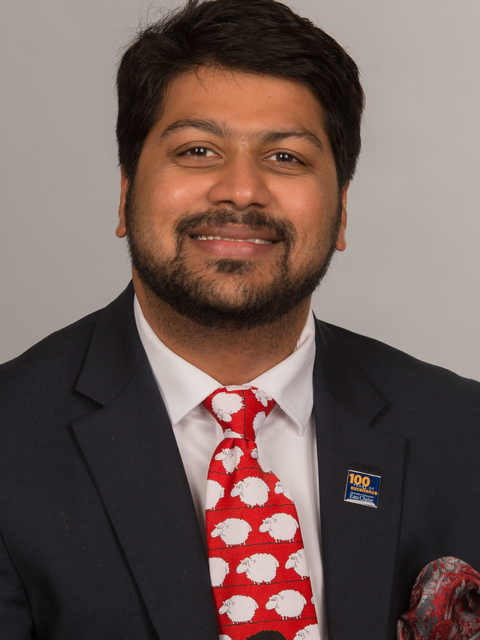
Meet Kranti Dugar, Ph.D.
Assistant Professor, Marketing
Hometown: Agartala, India
Why I teach marketing . . . it’s an exciting blend of behavioral psychology, people-centrism in consumption, and a mirror of the society we live in. What better way to enlighten minds than to hold up a mirror against students’ faces?”
Why I become a professor . . . my teachers and professors have always been my inspiration. It was in a consumer behavior class during my MBA that I was observing (and absorbing) a professor’s lecture, and a light bulb went off in my head. I thought, "This is cool. I’d like to do this!"
My favorite thing to do on campus is . . . there are several things I like to do. Social time at Davies Center always tops the list. Sitting by Little Niagara Creek and hiking in Putnam Park are close second. Of course, on the work front, there is nothing more rewarding than coaching students on Indian cultural cues and general interactions in the classroom while teaching.
People are often surprised to learn . . . that I have visited 49 US states, been involved with 10 different universities worldwide, and still remember 6 Indian languages.
When I'm not working, you will find me . . . hiking at one of our spectacular national parks.
If I could go anywhere in the world, I would go to . . . Places are about people. Traveling is not about miles, but smiles. I’d go anywhere people are welcoming and friendly. That’s most of the world, by the way!
My favorite sports team is . . . the Indian Cricket team. Bleed blue!
Introducing the Class of 2023! Meet your classmates, business faculty and staff members, your advisors, and some of the college's student leaders at the COB Academic Mixer on Tuesday, September 3 from 1:00-2:15pm in Schneider Hall. Watch your e-mail for more details!
